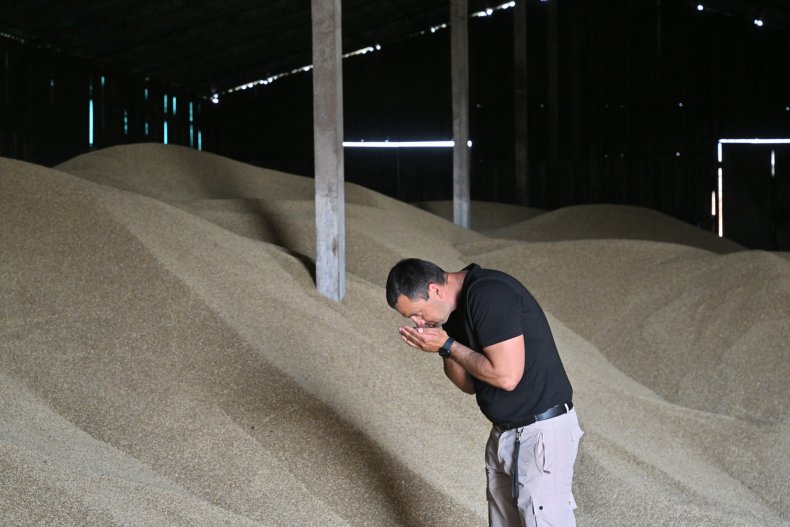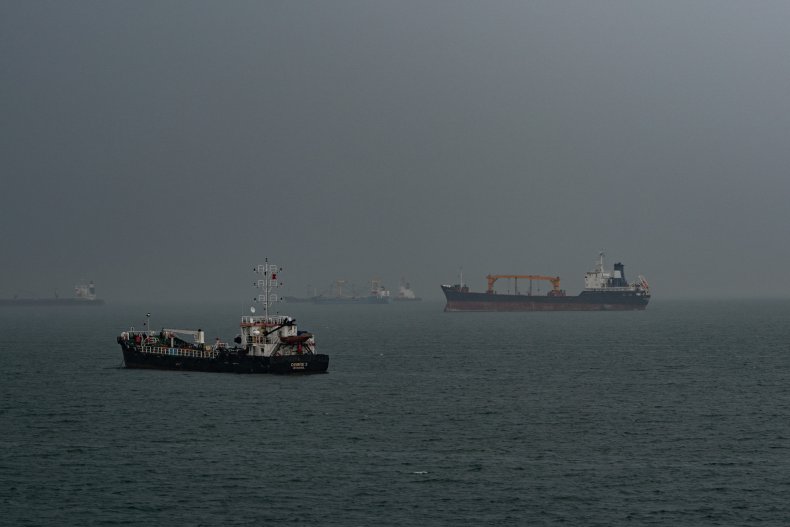Russia's renewed blockade of the Black Sea is imperiling enough Ukrainian foodstuffs to feed some 6 million people, according to President Volodymyr Zelensky's ecomomic adviser.
Ukraine is lobbying the international community to do more to alleviate the looming costs to its economy and a potential migration crisis.
"They are trying to destroy our ports," Oleg Ustenko told Newsweek in an interview on Wednesday, following the second consecutive night of Russian missile and drone attacks on cities including Odesa. There, Kyiv accused Moscow of intentionally targeting and destroying vital port infrastructure and 60,000 tons of grain slated for export.
The World Food Program estimated that Ukraine produced enough grain to feed around 400 million people worldwide prior to the war that Putin launched in February 2022.
"In our ports now, we have grain ready to go to the world," Ustenko said. "We are talking about huge amounts of grain, enough to feed at least 6 million people around the world... if we are not able to move this grain from our ports, it means that a country of the size of Denmark, Finland, Norway will not have food for their people."
"When the Russians destroyed yesterday this amount of grain, it means that they just left 300,000 people without food," Ustenko added of Tuesday night's attack on Odesa. "It's absolutely sure that if Ukraine does not have the chance to use the seaports and corridors, it's going to be a real disaster for the world."

If grain is unable to leave Ukrainian ports, Ustenko said, there will be no space to store the next harvest: "Basically, we don't have storage, meaning that almost everything is going to be lost... we are talking about billions of dollars which our farmers are going to lose."
Ukraine's already-devastated economy, Ustenko added, will be further punished. "Budget revenues will decline by at least, I would say, $6 billion," he said. "For us, it's a huge number."
Russian authorities announced their withdrawal from the Black Sea Initiative—in operation since July 2022 under the guardianship of the United Nations and Turkey—on Monday. The agreement has allowed the export of some 36 million tons of grain since its introduction, ensuring the security of commercial shipping transiting the Black Sea; a hot theater of Russia's full-scale invasion of Ukraine.
Moscow's withdrawal from the Black Sea Initiative came after the latest attack on the Kerch Strait Bridge, an operation reportedly conducted using naval drones and blamed on Kyiv by the Kremlin.
Kremlin spokesman Dmitry Peskov said that the decision was not based on the attack hours earlier on Crimea's Kerch Strait Bridge, which the Russians have accused Ukraine of carrying out, but for which Kyiv has not claimed responsibility. Instead, Moscow has said that the Black Sea Initiative deal unfairly benefited Ukraine.
Sergei Lavrov, Russia's foreign minister, spoke with his Turkish counterpart Hakan Fidan on Tuesday and proposed "an alternative" to the beleaguered Black Sea Initiative "for supplying grain to the countries most in need, not dependent on the subversive actions of Kyiv and its Western patrons," according to a readout published by the Russian Foreign Ministry.
Russia is now demanding sanctions relief and other concessions in exchange for reviving the initiative. Ukrainian Deputy Prime Minister Olha Stefanishyna told Newsweek Wednesday that the Odesa air strikes were "revenge" for the bridge attack.
The collapse of the accord—which was always shaky and required extending every 60 days or so—again raises the specter of rising global food prices, and even famine in poorer countries located in the so-called "Global South." Ukraine and a host of international backers have accused Russia of weaponizing food by reintroducing its blockade.
Undeterred, Moscow announced on Wednesday that all ships travelling to Ukraine will be considered as possible carriers of military cargo. Russia added that "the flag countries of such ships will be considered parties to the Ukrainian conflict." And the White House said Wednesday that the Russians had laid new naval mines to block access to Ukrainian ports.
Turkish President Recep Tayyip Erdogan and UN Secretary General Antonio Guterres have said they intend to push Russian President Vladimir Putin back towards the accord. However, in the meantime, Ustenko told Newsweek that Kyiv and its foreign customers face catastrophe.
"With our grain, we are feeding somewhere between 400 million and 600 million people worldwide," he said. "It's crucially important to unblock our ports and start to deliver our grain to the world."
Russia, Ustenko added, intends to exacerbate precarious food security in the "Global South" in the hope of driving a new migration crisis towards Europe and North America. Moscow and its allies in Belarus have previously been accused of weaponizing migrant flows into Europe from its eastern and southern flanks. Newsweek has contacted the Russian Foreign Ministry by email to request comment.
"They would love to see the hunger," Ustenko said. "They definitely understand that immigration is growing, the level of immigration, the rate of immigration is going to accelerate. This is the card they want to play.
"I would say that now they are becoming even more aggressive. Even thinking in terms of our economy, in terms of our agricultural sector, they're becoming even more aggressive," Ustenko added. "My understanding is that they realized that they would gain nothing from this war, they are losing this war. And since they are losing this war, they are becoming even more aggressive."

"The only way is just to make sure that Ukraine is getting its victory as soon as possible. And that Russia—I mean the government, the Russian regime—is collapsing. Because, again, they have this barbarian behavior. It's completely unacceptable. They know what they're doing."
Russia's withdrawal from the deal, the aide suggested, could harm its standing with nations in Africa, the Middle East, and South America. They have so far been hesitant to join Western condemnation and economic retaliation for the Kremlin's full-scale invasion of Ukraine.
"They are starting to realize, eventually, that who is really to be blamed is Russia," Ustenko said of the poorer countries who are disproportionately bearing the burden of reduced agricultural exports.
"Nobody else is responsible for that. The Russians started this war, Russians are destroying our harvest, Russians are doing everything possible to make sure that our grain and our food are not supplied to the world. They want to control it."








